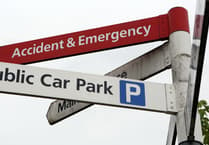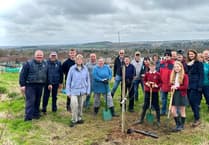The recent fall in Covid infections across all four home nations, as reported through the weekly ONS survey, is certainly welcome news.
But the focus remains on ensuring impact on the NHS can be minimised as we head into the autumn and winter.
The UK is the first country to approve a dual vaccine that targets both Omicron and the original Covid virus, which has of course mutated substantively since its detection in Wuhan.
The new Moderna vaccine – called Spikevax – is known as a bivalent vaccine as it takes on the two forms of the virus, and will be rolled out next month as part of the national immunisation programme.
The government have taken the latest JCVI advice for the autumn booster roll-out, with the most vulnerable once again having the greatest priority.
All adults aged over 50 will be eligible for the booster, alongside care-home residents and staff, as well as front-line health and social care workers.
As expected, people aged under 50 who are in a clinical risk group, are carers or household contacts of people with immunosuppression are also being targeted.
Although we don’t yet know the precise variant we will be facing in the coming months, having a booster will increase immunity against severe illness, and that is why it is important for eligible people to take up the vaccine when the opportunity comes.
As previously, the JCVI has recommended boosters to be offered at least three months after the previous dose, and there will of course need to be some operational flexibility in how the programme is delivered.
We have learned a great deal throughout the pandemic, rolling out the fastest vaccination programme in Europe.
This helped build a wall of defence to protect people and our health services, and I would certainly encourage everyone to come forward when they are invited for a jab.
The annual flu programme will also begin as usual in September, and the government announced recently this would again be extended to include secondary school children in Years 7, 8 and 9 as well as healthy people aged 50 to 64, who should expect to be offered jabs from mid October.
As we continue living with Covid it is important we continue to be vigilant. We’re likely to see spikes in infection in the months ahead, and that will inevitably place pressure on health services.
And just as many hospitals and health services re-introduce the mandatory use of face masks, we may see further measures being taken to help control its wider spread.
Tackling the backlogs in the NHS remains a key priority, as does the on-going reform to health and social care services.
I’m pleased to be attending the official opening (and one-year anniversary) of the Urgent Treatment Centre at Petersfield Community Hospital, which helps reduce the need for visits to A&E.
Opening in 2021, the centre is aimed at people over the age of one year who require urgent treatment for minor injuries and illnesses, and has access to a wide selection of onsite tests and equipment that helps to treat a range of minor injuries and illnesses
As a family, we’ve had cause to use the UTC, so, when it is appropriate and possible, I can attest to the greater convenience relative to going to QA, which would have been the alternative.
I know we all share in the admiration and gratitude for the wonderful staff who work across our NHS and social care services, who look after us when we need it most. Ensuring it is fit for the future is certainly one of the most important challenges we face as a country.




